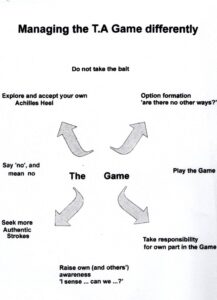Controversial opening, eh!
This from a man who says that a small, safe experiment needs to fit in with your experience of living!! That said, I do see the importance of the Expectation Effect as described by David Robson when he warns us that we see what we expect to see.
Our experience takes us in a particular direction. It is not unreasonable to get attached to that experience and keep it safe by repeating things, rather than changing things.
See the very bottom of my welcome page for further details and comment on the value of ‘just noticing’.
Although ‘just noticing’ is an important ‘first’ safe experiment, it is not easy to be open to subtle cues around us – especially ones that contradict our core beliefs.
What Sisyphus did next
Bear with me as I talk a bit about Sisyphus and his lived experience. Therapists are very attached to the Greeks! Particularly an early therapist …. sorry, philosopher, Socrates.
Sisyphus transgress the gods and he was condemned to push a large boulder up one side of a hill for it to roll down the other. Then, he had to start all over again.
His life consisted of repeating the same old thing, year in and year out.
You and I are perfectly capable of doing the same thing. Safe experimenting is intended to inoculate against that tendency by building up new knowledge about the world through direct, first-hand action in everyday events.
There seems to be a growing demand that requires us to respect another person’s lived experience – not the person, mind you – but their lived experience: the things they have done, and the consequences of those experiences. Sisyphus was not able to offer us a good example.
This modern revision relating to the ‘lived experience’ is an understandable reaction to the paternalistic alternative that asked us to accept representations of our world constructed by other people. My quote from Milton Erikson highlights that such ‘constructions’ are not always helpful. My header illustration on this page seeks to demonstrate that there are better alternatives available in the world of therapy.
So what’s my beef?
After all, this website is full of views, that is, ‘representations’ of others. I would not devote so much energy to recording them if I did not think they can be helpful.
There is a rather subtle issue here.
It’s one thing to value another person. We can all vote for that. It’s called ‘respect’ and, like truth and beauty, very few will vote against it.
However, it is another thing to assume that my substantial life experience is enough and sufficient. Although I advertise my experience and qualifications as a psychologist, how do you know whether I have had 25 years of experience building up year on year, or simply had one years’ experience, revisited 25 times!?
Furthermore, we make mistakes; I’ve made mistakes and suffered a good few small defeats. The whole point is that my ‘small defeats’ encourage me to change; they are an essential part of my learning experience.
….. BUT ONLY IF I’VE NOTICED IT
Truth be told, some of us do not notice our defeats, or we take a long time to notice them. So the key is not to be condemned to repeat aspects of our history that get us into difficulties, time and time again.
My life experiences have got me into difficulties – and who can say this has not happened to them – once you get to a certain age! It follows that it’s feasible for me to get others into difficulties if I approach my life experience, unexamined. This website, and my quote from Socrates, warns against not reflecting on who I am, and what I have done.
If you follow Socrates, then taking unthinking advice on small, safe experiments, might be be counter-productive.
An example
Once I received a ’round Robin’ email asked for some advice on how to respond to a common, but troubling piece of human behaviour that was unsettling a therapist. I offered a short reply focusing on how the therapist and her client might do something (anything!) just a little bit different.
For one reason or another, the initial question raised a lot of interest. A number of specific ‘suggestions’ began to emerge from colleagues around the country. One such response stuck in my mind, and it niggled me. It took time to realise where that niggle came from. The offering was a very well accepted CBT strategy. It was realistic and should have been uncontentious.
As I thought about it, I re-read the thread of emails again and I noticed my colleague recommended the strategy because it had worked for her on a personal level many years before. It fitted her lived experience at that time. I could be pleased that she had found a small, safe experiment that worked for her. However, it does not follow that her ‘experiment’ will work for every person, now.
More importantly, why make this offering for this particular client and therapist, now? None of us knew either party at all!
Who do we do things for?
My first answer is: too often for ourselves.
This example of the email demonstrates how ‘lived experience’ can promote an arrogant stance; one that says: it worked for me, so it should work for you. I have made similar points through the website and I will bring some of them together here:
Who is responsible for the small safe experiment?
Can you do safe experiments for other people?
Finding the wisdom to know what is do-able; what can be changed.
Here is the nub: perfectly respectable strategies can be identified by therapists using their training and lived experience – professional and personal. However, for that strategy to be effective, that strategy needs to be translated by the person wanting to use it.
That therapist’s strategy, emerging from his or her ‘lived experience‘, might help some clients; maybe a good few, but never all. Francine Shapiro, founder of Eye Movement De-sensitisation and Reprocessing (EMDR) is said to have ‘discovered’ the benefits of eye movement walking along a beach on day. It’s surprising how many new therapies have been discovered by such personal experiences.
If I can be contentious: St Paul helped to found a religious movement on the basis of his experience of walking along a street toward Damascus. His ‘lived experience’ led to a number of problems for the followers of the then-departed Christ.
What works for whom
The problem is not to know which safe experiments work, but rather, finding out what works for whom. More importantly, what works for you.
How do I step back far enough to question my own assumptions about my solutions-in-life. Even then, I need to accept that my solutions may not work for others.
Without developing that skill of stepping back, I may lose the ability to help others translate their experiences.
Reading the website from end-to-end, and making a long list of possible safe experiments, will not hack it. Real changes are often hard-won. I have become who I am through decades of habit-forming behaviours. I am not likely to change any one behaviour overnight. My lived experience may well work against me. If that is true for me, then it can be true for others – in general.
So watch out!! Respecting our clients is one thing; colluding with them to claim that I am ‘honouring’ their life experience is another.
Sometimes, a lived experience needs to be challenged. The tricky thing is knowing how to do that effectively – without being patronising and alienating others.
So with these thoughts in mind, what small, safe experiments might help here?
SOME EXPERIMENTS
Self disclosure: recently, I had to use this skill when I slipped into ‘instructional’ behaviour with a client. In a short time, it dawned on me that I was responding in similar ways to my client in her dealings with key people in her life. My approach to therapy meant that I was easily tempted to join in! It was not enough to see this ‘parallel process’ – between ‘client’ and others in her life, and ‘client with me, My response was to own my instructional way and to speak to her about it as my Achilles Heel. This was a necessary preliminary step toward negotiating something more authentic for the two of us. I put myself over less as a psychologist, and more as a man, and shared a vulnerability. In training, we were once warned about such actions; they might have a negative impact on a client’s confidence in us, as practitioners.
Now self-disclosure is more acceptable in the therapeutic relationship. You, too, can use the first person and present tense to ‘own’ your behaviour. If you do this: consider how and when have you self-disclosed in recent times, and what was the outcome?
Authentic responding: this involves not only admitting some of your own limitations, but identifying the connected feelings and sensations. this is not easy to do without inviting some criticism, but essential if your humanness is to be respected. Transactional Analysis has much to say about alternative ‘authentic’ responding. Consider the illustration below:

This illustration contains a whole list of potential small, safe experiments. More can be found on my page addressing the rather tricky human tendency to “Play the Game“. There you will find a comment on our ‘Achilles Heel‘, based on yet another Greek tale.
Alternatives to playing the TA Game can be found in assertiveness, exercising responsibility and raising your own awareness. Follow the hyperlinks to explore what these strategies can mean on a day-by-day basis.
As stated, these skills assume a degree of self-reflection and the ability to stand back.
Use the various ‘Windows’ to help yourself along that scenic route:
…. Johari
….. Discount
as well as the Ripple Effect
…. and put together by me at: When safe experiments falter
Provisional thinking and speaking: this is concerned with the style and delivery of communications.
Stepping back: is more feasible if we can practice the ‘just noticing’ experiment for brief moments – on a random and frequent basis.
Option formation: the choices you have in life can be extended by working with another person for a brief period of time, and under carefully prepared arrangements.
All these potential small, safe experiments have the potential to help us see beyond our own ‘lived experience’.
